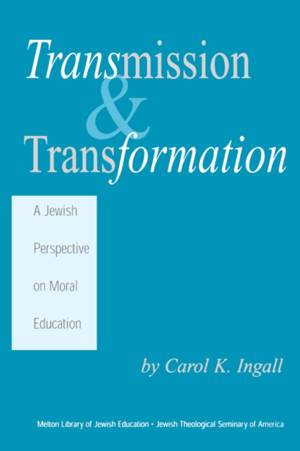
- Afhalen na 1 uur in een winkel met voorraad
- Gratis thuislevering in België vanaf € 30
- Ruim aanbod met 7 miljoen producten
- Afhalen na 1 uur in een winkel met voorraad
- Gratis thuislevering in België vanaf € 30
- Ruim aanbod met 7 miljoen producten
Zoeken
Transmission & Transformation
A Jewish Perspective on Moral Education
Carol K Ingall
Hardcover | Engels
€ 33,95
+ 67 punten
Omschrijving
Transmission and Transformation: A Jewish Perspective on Moral Education is addressed to teachers, principals, and rabbis struggling to make sense of the competing claims of moral education authorities in both the Jewish and general education sectors. It contrasts traditional and contemporary Jewish moral education and sets Jewish moral education into the wider context of values education in American public and private schools. The author helps the reader to reflect on the literature on moral education from a number of perspectives, including classical rabbinic sources, sociology, cognitive development, and sociobiology, in order to create a moral climate in a school which honors tradition while embracing modernity. At the heart of the book are Ingall's eight E's of moral education: Excellences, Environment, Experience, Expectations, Explanation, Examination, Exemplars, and Empathy. Each of these eight chapters includes practical suggestions for implementing these elements into the daily life of Jewish schools and informal settings.
Specificaties
Betrokkenen
- Auteur(s):
- Uitgeverij:
Inhoud
- Aantal bladzijden:
- 180
- Taal:
- Engels
Eigenschappen
- Productcode (EAN):
- 9781929419029
- Verschijningsdatum:
- 1/01/1999
- Uitvoering:
- Hardcover
- Formaat:
- Genaaid
- Afmetingen:
- 152 mm x 229 mm
- Gewicht:
- 421 g

Alleen bij Standaard Boekhandel
+ 67 punten op je klantenkaart van Standaard Boekhandel
Beoordelingen
We publiceren alleen reviews die voldoen aan de voorwaarden voor reviews. Bekijk onze voorwaarden voor reviews.











